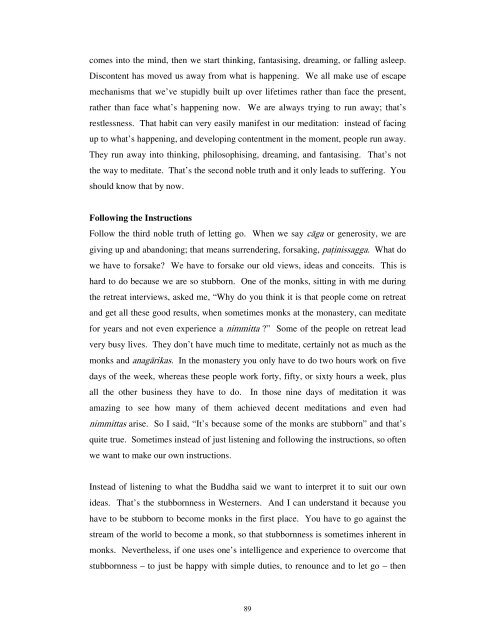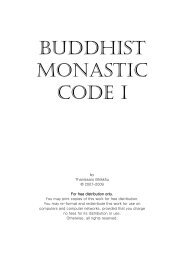- Page 2 and 3:
Simply ThisMoment!A COLLECTION OF T
- Page 4 and 5:
CONTENTSPage1 Ways and Means into J
- Page 6 and 7:
This gives one great insights into
- Page 8 and 9:
ūpaloka, even though we are only a
- Page 10 and 11:
too much body-awareness. With body-
- Page 12 and 13:
and thoughts - apart from the exper
- Page 14 and 15:
faculty of the mind to sustain and
- Page 16 and 17:
- and this is a natural phenomena -
- Page 18 and 19:
involved I stress the word ‘fully
- Page 20 and 21:
though he was a Noble disciple pass
- Page 22 and 23:
Anyone who claims the experience of
- Page 24 and 25:
Sometimes people have so little con
- Page 26 and 27:
the shelf and we know how this whol
- Page 28 and 29:
The Delusion of Freedom‘That whic
- Page 30 and 31:
monk telling me once that his fathe
- Page 32 and 33:
say that in the Anupada Sutta (MN 1
- Page 34 and 35:
it’s been still for a long time,
- Page 36 and 37:
3 DETOXIFYING THE MIND2 nd of Febru
- Page 38 and 39:
consciousness - or as I would prefe
- Page 40 and 41: is letting go of the pleasures of t
- Page 42 and 43: never overcome thirst in that way.
- Page 44 and 45: Use the triple practice of sãla, s
- Page 46 and 47: after another, hundreds, thousands
- Page 48 and 49: much fire in their minds. This is w
- Page 50 and 51: 4 LOOKING FOR THE SWEET CHILLISeeki
- Page 52 and 53: Listening to fine music. Is this it
- Page 54 and 55: freedom is not freedom at all becau
- Page 56 and 57: We have a story in Buddhism of the
- Page 58 and 59: This is real contentment! This is r
- Page 60 and 61: Watch this inner conversation going
- Page 62 and 63: monastic life does respect the sile
- Page 64 and 65: delusion because it has kept us goi
- Page 66 and 67: This is the opposite of suffering.
- Page 68 and 69: ight view. It’s very hard for a h
- Page 70 and 71: always be on the wrong path, and on
- Page 72 and 73: “Look, if this is causing sufferi
- Page 74 and 75: out of control. The monastery goes
- Page 76 and 77: the past and the future, and we’r
- Page 78 and 79: at all. Who can trust memory? In me
- Page 80 and 81: can. Give it full attention every m
- Page 82 and 83: in the morning, afternoon or evenin
- Page 84 and 85: yourself from all that’s happened
- Page 86 and 87: mutti is releasing and anālaya is
- Page 88 and 89: instructions without question.It’
- Page 92 and 93: anymore. All that controlling, mani
- Page 94 and 95: Once the beautiful breath appears t
- Page 96 and 97: up from within the lake in which yo
- Page 98 and 99: teaches insight and anyone who teac
- Page 100 and 101: ‘slow and the happy’, and the
- Page 102 and 103: You know it is going to happen that
- Page 104 and 105: dispassion or fading away, which le
- Page 106 and 107: caves, so dark, so silent, just hav
- Page 108 and 109: that if you follow those instructio
- Page 110 and 111: was to dig the earth, to get a spad
- Page 112 and 113: going to be led by you, I’ll be l
- Page 114 and 115: wisdom. And you know it’s wisdom
- Page 116 and 117: I would like to talk this evening a
- Page 118 and 119: what he wished did even better than
- Page 120 and 121: or be allowed to actually practise.
- Page 122 and 123: vanish, and you won’t be able to
- Page 124 and 125: There are some freedoms that we lov
- Page 126 and 127: questions. This is a good way for p
- Page 128 and 129: a woman, you say you are a woman. Y
- Page 130 and 131: around with this partner and that p
- Page 132 and 133: Everyone has the opportunity to mak
- Page 134 and 135: 9 JHĀNAMEDITATIONFremantle Zendo21
- Page 136 and 137: letting go means because when you l
- Page 138 and 139: finished’?” He would reply, “
- Page 140 and 141:
people who have been living togethe
- Page 142 and 143:
In the same way, whatever problems
- Page 144 and 145:
and then they seem to be going towa
- Page 146 and 147:
thinking, ‘When is he going to st
- Page 148 and 149:
eautiful blaze of light. They illum
- Page 150 and 151:
inding. The whole idea of Buddhism
- Page 152 and 153:
ackwoods country hicks had no busin
- Page 154 and 155:
‘When your mother has grown older
- Page 156 and 157:
don’t want to see something you j
- Page 158 and 159:
is disgusting stuff; how can anyone
- Page 160 and 161:
eally listening and they were happy
- Page 162 and 163:
are the two main hindrances. They a
- Page 164 and 165:
11 EQUANIMITY23 rd August 2000In th
- Page 166 and 167:
keep out unwholesome states and aro
- Page 168 and 169:
happily in a monastery, or in any c
- Page 170 and 171:
were willing it to go. It was them
- Page 172 and 173:
How often is it that people start t
- Page 174 and 175:
getting involved, just being a spec
- Page 176 and 177:
Craving is like the hot fire. The m
- Page 178 and 179:
completely. It’s being virāga, i
- Page 180 and 181:
take to be life, what we take to be
- Page 182 and 183:
giving the energy for another rise,
- Page 184 and 185:
alone experience.People in the worl
- Page 186 and 187:
everything to fade away, the breath
- Page 188 and 189:
ealise is impermanent, and it can f
- Page 190 and 191:
can give up, especially your ideas,
- Page 192 and 193:
sensations and new delights. Very o
- Page 194 and 195:
all that goes on outside. The whole
- Page 196 and 197:
go inwards, in the opposite directi
- Page 198 and 199:
arise with the release of that worl
- Page 200 and 201:
that. Incline towards that. Don’t
- Page 202 and 203:
you and for others. Just look at wh
- Page 204 and 205:
of this flame of doing, the end of
- Page 206 and 207:
lobha, the first kilesa, means gree
- Page 208 and 209:
Living simply should be one’s goa
- Page 210 and 211:
villagers are feeding me and I’m
- Page 212 and 213:
peacefulness from time to time. Som
- Page 214 and 215:
stronger. When the mind is blissed
- Page 216 and 217:
If you go in the opposite direction
- Page 218 and 219:
to talk about what is deeply within
- Page 220 and 221:
You understand why the Buddha said
- Page 222 and 223:
you get happiness, and that should
- Page 224 and 225:
on just one sense, the physical sen
- Page 226 and 227:
illusion that there is something to
- Page 228 and 229:
difference between the six consciou
- Page 230 and 231:
or whatever other ache you have. Th
- Page 232 and 233:
16 BREAKING THE BARRIERThe Five Hin
- Page 234 and 235:
ody, and the other khandhas. This s
- Page 236 and 237:
I learned a lot of Pāli from the V
- Page 238 and 239:
that’s par for the course.Underst
- Page 240 and 241:
called the body’s bluff, and the
- Page 242 and 243:
That’s why in meditation it is go
- Page 244 and 245:
have sloth and torpor while those w
- Page 246 and 247:
Because it doesn’t move it builds
- Page 248 and 249:
five hindrances are manifestations
- Page 250 and 251:
the message by now. It states in th
- Page 252 and 253:
It sometimes happens, when you star
- Page 254 and 255:
we can’t understand it or see it
- Page 256 and 257:
meditation?perspective.All this doi
- Page 258 and 259:
Whatever the mind wants to do, that
- Page 260 and 261:
one.” “Come on, the next one wi
- Page 262 and 263:
itself. And then the breath comes u
- Page 264 and 265:
came out afterwards as probably the
- Page 266 and 267:
18 BETWEEN THE OBSERVER AND THE OBS
- Page 268 and 269:
It’s not what you are doing but h
- Page 270 and 271:
That’s why Ajahn Chah said, “It
- Page 272 and 273:
of self with the sloth and torpor t
- Page 274 and 275:
in the right place. If we don’t d
- Page 276 and 277:
are you doing it? What’s between
- Page 278 and 279:
things you want to believe cannot e
- Page 280 and 281:
seeing and the seen. There is no at
- Page 282 and 283:
These days I really shy away from c
- Page 284 and 285:
about not wanting to be here in the
- Page 286 and 287:
where Māra was playing. They saw t
- Page 288 and 289:
When the ‘me’ illusion is activ
- Page 290 and 291:
enough, and so I don’t want to mo
- Page 292 and 293:
vehicle of the breath just stops. T
- Page 294 and 295:
stopped’ mean? It means you can
- Page 296 and 297:
and completely stop and to see the
- Page 298 and 299:
There is no end of things to get ou
- Page 300 and 301:
The Buddha taught the cause of all
- Page 302 and 303:
Now, this might just be words, but
- Page 304 and 305:
How many things are you doing and w
- Page 306 and 307:
world. When we are speaking we don
- Page 308 and 309:
not Ajahn Chah, that was me”, thi
- Page 310 and 311:
these things disappear, you’ve sa
- Page 312 and 313:
about these experiences is that whe
- Page 314 and 315:
You understand that all these dhamm
- Page 316 and 317:
of both body and mind and the whole
- Page 318 and 319:
THE GLOSSARYAnāgāmīmī: Non Retu
- Page 320 and 321:
5. DoubtHiriiri-ottappaottappa: Mor
- Page 322:
Theragāththā: Hymns of the Elders






